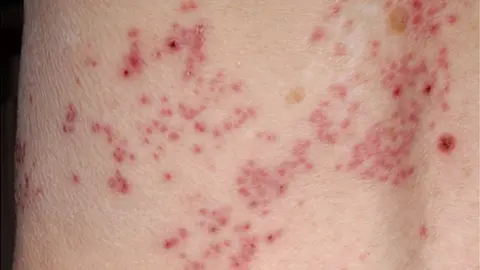Shingles vaccine 'has cut cases by a third' in England
 Science Photo Library
Science Photo LibraryCases of shingles have reduced by 35% in England since a vaccine was offered to 70-year-olds, Public Health England says.
But it is urging more people in their 70s to get their free injection against the painful condition.
They are most at risk of shingles and more likely to develop complications, such as severe nerve pain.
Shingles is caused by the reactivation of the chicken pox virus and results in a nasty skin rash and fever.
The vaccine programme started in England in 2013 and 5.5m people were eligible for the free single injection over the first three years.
A report in the Lancet Journal of Public Health on how much difference the jab has made between 2013 and 2016 found that roughly 17,000 GP visits for shingles had been avoided.
And another 3,300 consultations were avoided for one of the main complications of shingles - post-herpetic neuralgia (PHN) or long-term pain.
'Nasty disease'
From the data collected, PHE estimate that the vaccine is 62% effective against shingles and between 70-88% effective against PHN.
Despite the reduction in shingles cases, however, the numbers taking up the offer of the vaccine have gone down slightly since 2013.
Dr Mary Ramsay, head of immunisations at Public Health England, encouraged all those eligible to make an appointment at their GP practice to get the shingles vaccine.
"It's the best way to avoid this very nasty disease and the long-term complications that can develop from having it," she said.
"Our population is aging and the risk from getting shingles and complications is higher as you get older.
"Immunisation is the best way to protect yourself from this painful, sometimes debilitating condition."
More than 50,000 cases of shingles occur in people aged 70 years and over each year in England and Wales - and around 50 cases are fatal.
Who can have the shingles vaccination?
- All those aged 70, or at 78 as part of a catch-up option
- Also, anyone who missed out up until their 80th birthday
- The shingles vaccine is not available on the NHS if you are aged 80 or over
What is shingles?
- It is a form of the chicken pox virus which has been hiding in the body and been reactivated
- Symptoms are a skin rash on one side of the body, sharp stabbing pain and burning of the skin, headache and fever
- It can last for two to four weeks and be very debilitating
- Shingles can sometimes lead to complications, including severe nerve pain lasting for several months or more
- It is not contagious, but it is possible to catch chickenpox from someone with shingles if you haven't had chickenpox before
